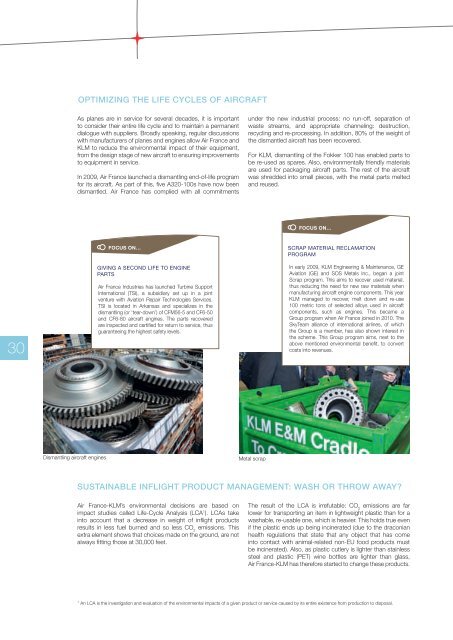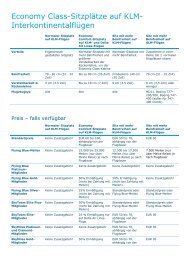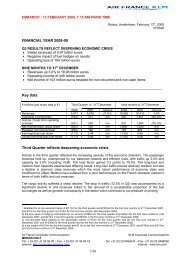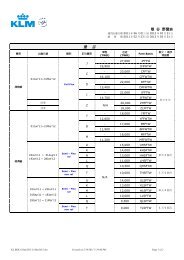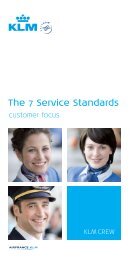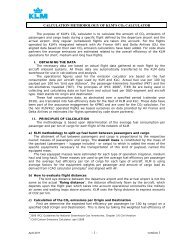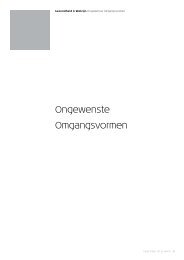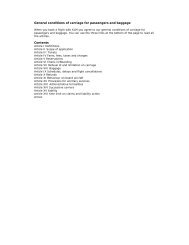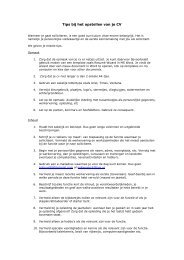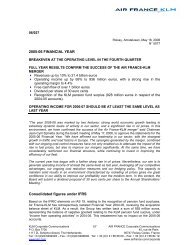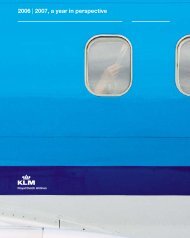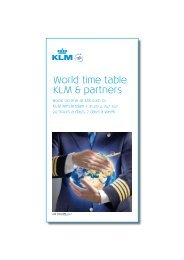CORPORATE SOCIAL RESPONSIBILITY REPORT 2009-10
CORPORATE SOCIAL RESPONSIBILITY REPORT 2009-10
CORPORATE SOCIAL RESPONSIBILITY REPORT 2009-10
Create successful ePaper yourself
Turn your PDF publications into a flip-book with our unique Google optimized e-Paper software.
30<br />
Dismantling aircraft engines<br />
OPTIMIZING THE LIFE CYCLES OF AIRCRAFT<br />
As planes are in service for several decades, it is important<br />
to consider their entire life cycle and to maintain a permanent<br />
dialogue with suppliers. Broadly speaking, regular discussions<br />
with manufacturers of planes and engines allow Air France and<br />
KLM to reduce the environmental impact of their equipment,<br />
from the design stage of new aircraft to ensuring improvements<br />
to equipment in service.<br />
In <strong>2009</strong>, Air France launched a dismantling end-of-life program<br />
for its aircraft. As part of this, five A320-<strong>10</strong>0s have now been<br />
dismantled. Air France has complied with all commitments<br />
FOCUS ON…<br />
GIVING A SECOND LIFE TO ENGINE<br />
PARTS<br />
Air France Industries has launched Turbine Support<br />
International (TSI), a subsidiary set up in a joint<br />
venture with Aviation Repair Technologies Services.<br />
TSI is located in Arkansas and specializes in the<br />
dismantling (or ‘tear-down’) of CFM56-5 and CF6-50<br />
and CF6-80 aircraft engines. The parts recovered<br />
are inspected and certified for return to service, thus<br />
guaranteeing the highest safety levels.<br />
Air France-KLM’s environmental decisions are based on<br />
impact studies called Life-Cycle Analysis (LCA 1 ). LCAs take<br />
into account that a decrease in weight of inflight products<br />
results in less fuel burned and so less CO 2 emissions. This<br />
extra element shows that choices made on the ground, are not<br />
always fitting those at 30,000 feet.<br />
under the new industrial process: no run-off, separation of<br />
waste streams, and appropriate channeling: destruction,<br />
recycling and re-processing. In addition, 80% of the weight of<br />
the dismantled aircraft has been recovered.<br />
For KLM, dismantling of the Fokker <strong>10</strong>0 has enabled parts to<br />
be re-used as spares. Also, environmentally friendly materials<br />
are used for packaging aircraft parts. The rest of the aircraft<br />
was shredded into small pieces, with the metal parts melted<br />
and reused.<br />
Metal scrap<br />
FOCUS ON…<br />
SCRAP MATERIAL RECLAMATION<br />
PROGRAM<br />
In early <strong>2009</strong>, KLM Engineering & Maintenance, GE<br />
Aviation (GE) and SOS Metals Inc., began a joint<br />
Scrap program. This aims to recover used material,<br />
thus reducing the need for new raw materials when<br />
manufacturing aircraft engine components. This year<br />
KLM managed to recover, melt down and re-use<br />
<strong>10</strong>0 metric tons of selected alloys used in aircraft<br />
components, such as engines. This became a<br />
Group program when Air France joined in 20<strong>10</strong>. The<br />
SkyTeam alliance of international airlines, of which<br />
the Group is a member, has also shown interest in<br />
the scheme. This Group program aims, next to the<br />
above mentioned environmental benefit, to convert<br />
costs into revenues.<br />
SUSTAINABLE INFLIGHT PRODUCT MANAGEMENT: WASH OR THROW AWAY?<br />
The result of the LCA is irrefutable: CO 2 emissions are far<br />
lower for transporting an item in lightweight plastic than for a<br />
washable, re-usable one, which is heavier. This holds true even<br />
if the plastic ends up being incinerated (due to the draconian<br />
health regulations that state that any object that has come<br />
into contact with animal-related non-EU food products must<br />
be incinerated). Also, as plastic cutlery is lighter than stainless<br />
steel and plastic (PET) wine bottles are lighter than glass,<br />
Air France-KLM has therefore started to change these products.<br />
1 An LCA is the investigation and evaluation of the environmental impacts of a given product or service caused by its entire existence from production to disposal.


